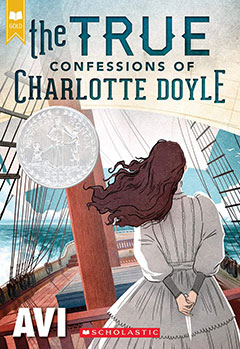 A recent online review of one my books referenced The True Confessions of Charlotte Doyle, as “the Pinnacle” of my writing career.
A recent online review of one my books referenced The True Confessions of Charlotte Doyle, as “the Pinnacle” of my writing career.
That book was published in 1990 and was my twenty-second book.
Since that time—thirty years ago—I have published sixty-one more books.
Accepting the premise of the “pinnacle” as metaphor, does that mean I have been going downhill these past thirty years? And, since the reviewer was so certain of Charlotte’s place among my books, is it fair to ask, were all my other books read before making that judgement?
In truth I know of no one who has read all my books, and that includes my wife. I like to joke that not even I have read them all.
It’s true there are many times I’ve been asked, “what’s my best book?” The simple answer is: I don’t know. My way of evaluating my own work is, “Did I achieve what I set out to do?”
But there are many other ways to evaluate a writers’ work: Copies sold? Copies read? Winner of most awards? Most adult-judged awards? Most children’s choice awards? Most referenced? Most critical notice? Most used in schools? The book that garnishes the most fan letters? The book my own kids think is best? Mind, you are welcome to arrange these categories in whatever way you want (or add another), according to what you think is most important.
It’s safe to say that not one of my books meets all these criteria.
I once asked a very famous writer why she didn’t write books anymore. She said: “People tell me I’ve written the best book ever. Why should I bother to write another? They won’t like it.”
I have always thought that one of the saddest comments by a writer I’ve ever heard.
Many a time online I’ve read side-by-side reviews of my books, one which says, “This is the best.” Another says, “This is the worst.” These are not objective critiques.
One of the great pleasures of reading, I think, is that each of us makes a subjective evaluation of each book we read. It is a powerful personal form of art. Moreover, our response to a book may differ according to the circumstance in which we read it. The book I read on a long flight may elicit a different reaction if read in the comfort of my reading chair. The book I loved when I was twelve is not necessarily the book I loved when fifty. But the love at each time is real.
How do we know if a particular book is a good one? (Not necessarily the best.) If a lot of people like it for a lot of years.
Another question I’m often asked is, “What’s your own favorite book?” That answer I’m happy to give because it’s always true: “My favorite book is the one I’m working on.” That’s because I’m trying to make it the best ever.
Until I start a new one.
My great hope is that my last book—whatever, whenever that is—will be my best.
You can decide.
6 thoughts on “Achieving the Pinnacle”
I used to express the subjectivity of it all by saying that when a thousand people read a book it becomes a thousand different books.
So true! As Avi states, it is a personal art, personal experience, a personal journey. Each book is unique just as each reader/writer is unique. That’s the beauty of the written word- means something different for everyone who experiences it from the author crafting it to the reader who becomes absorbed in the text.
Yes. Exactly. All of it. xx
I love reading whatever you write here and in your books. I can never answer what my favorite book is in a general way because I love and adore so many. I enjoy your blog so much and thank you again for your thoughtful, detailed and interesting posts here. PS I loved Charlotte Doyle so I can see why the reviewer loved it, but I agree about defining or finding a pinnacle among such treasure. Keep writing because you make a difference and you love it. And we are lucky.
A very healthy perspective!
Avi,
It’s such a shame that Charlotte isn’t recognized as a “strong female protagonist”. No, not really. She’s strong in the most important way: moral conviction.
Another way of judging a book’s merit is by the quality of its ideas. In that category, your work shines.